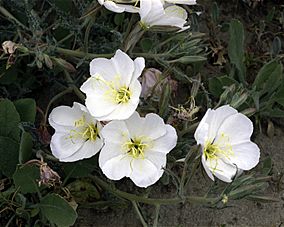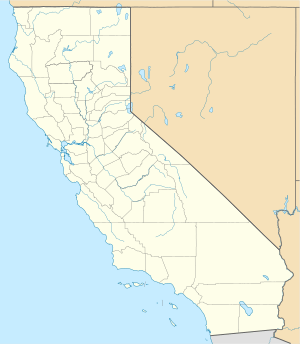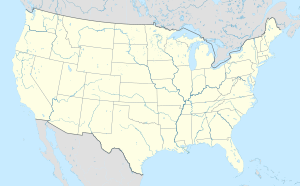Antioch Dunes National Wildlife Refuge facts for kids
Quick facts for kids Antioch Dunes National Wildlife Refuge |
|
|---|---|
|
IUCN Category IV (Habitat/Species Management Area)
|
|

|
|
| Location | Contra Costa County, California, United States |
| Nearest city | Antioch, California |
| Area | 55 acres (0.22 km2) |
| Established | 1980 |
| Governing body | U.S. Fish and Wildlife Service |
Antioch Dunes National Wildlife Refuge is a special place near the city of Antioch, California. It is located on the south side of the San Joaquin River. This refuge protects a unique sandy area called a dune habitat. It is home to three types of plants and insects that are in danger of disappearing forever.
Because these species are so rare, the refuge is usually closed to visitors. However, you can join special tours and events led by the refuge staff. The refuge was created in 1980. It is managed by the U.S. Fish and Wildlife Service.
Helping the Dunes Grow
Since 2013, a big project has been working to make the Antioch Dunes even better for wildlife. The Port of Stockton and the U.S. Army Corps of Engineers are helping with this.
The project involves taking sand from the San Joaquin River. This sand is then pumped to the Antioch Dunes. The main goal is to help the Lange's metalmark butterfly population grow.
How Sand is Added
Workers use a special machine to pump a mix of sand and water from the river. This mix goes through a screen to protect fish. The sand and water then flow through special areas that separate them. The water goes back to the river. The sand is spread out on the dunes.
After the sand is in place, new plants are added. These include buckwheat and two types of endangered plants. This helps create the perfect home for the rare insects and plants.
Rare Species at the Dunes
The Antioch Dunes National Wildlife Refuge protects three very special species. They are all considered "endangered," meaning they are at risk of dying out.
- The Lange's metalmark butterfly
- The Antioch Dunes evening primrose
- The Contra Costa wallflower
The Lange's metalmark butterfly population has faced challenges. For example, in 1999, there were 2,342 butterflies. By 2006, this number dropped to only 45. In 2013, there were 78 butterflies. The refuge works hard to protect these important creatures and plants.
 | William M. Jackson |
 | Juan E. Gilbert |
 | Neil deGrasse Tyson |



